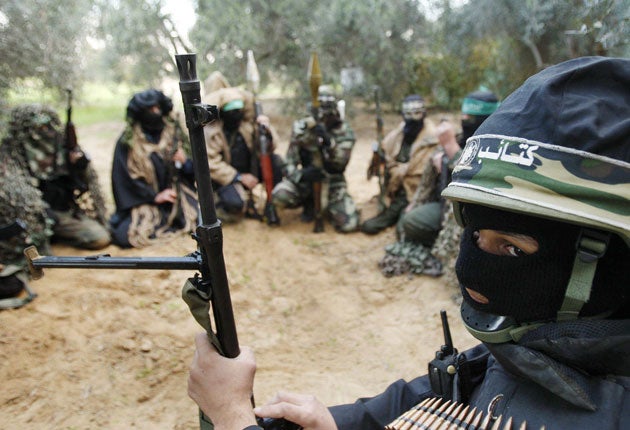Europe opens covert talks with ‘blacklisted’ Hamas

European nations have opened a direct dialogue with Hamas as the US intensifies the search for Middle East peace under Barack Obama.
In the first meeting of its kind, two French senators travelled to Damascus two weeks ago to meet the leader of the Palestinian Islamist faction, Khaled Meshal, The Independent has learned. Two British MPs met three weeks ago in Beirut with the Hamas representative in Lebanon, Usamah Hamdan. “Far more people are talking to Hamas than anyone might think,” said a senior European diplomat. “It is the beginning of something new – although we are not negotiating.”
Mr Hamdan said yesterday that since the end of last year, MPs from Sweden, the Netherlands and three other western European nations, which he declined to identify, had consulted with Hamas representatives.
“They believe they made a mistake by blacklisting Hamas,” he said, referring to the EU decision in 2003 to add the political wing of the movement to its list of terrorist organisations. “Now they know they have to talk to Hamas.”
Political contacts with Hamas are banned under the rules of the international Quartet for Middle East peace – which groups the US, the EU, Russia and the UN – on the grounds that the Palestinian faction remains committed to the destruction of Israel. The international community insists that the ban will only be lifted once the Islamists agree to recognise Israel and renounce violence. But the policy, set out in 2006 following the Hamas victory in Palestinian elections, has been called into question since the three-week war in Gaza which is ruled by Hamas.
Diplomats insisted that the lawmakers’ contacts with Hamas were at their own initiative, although they are presumed to have reported back to governments. The British MPs who went to Beirut “were not engaged in back channel or officially sanctioned talks,” said a Foreign Office spokesman.
The EU backs Egyptian-mediated efforts to secure reconciliation between Hamas and its Fatah rivals as part of a ceasefire agreement between Hamas and Israel. Palestinian unity is being encouraged as a prerequisite for a two-state solution.
But Mr Meshal told the French senators that Palestinian unity was “the most difficult issue”, according to a source familiar with the talks. “Meshal said the Palestinian Authority [led by the President Mahmoud Abbas, of Fatah] no longer represents anything,” said the source. Hamas is “convinced that the Arab street is with them”.
Hamas’s main backer, Syria, is also brimming with confidence after the three-week war failed to deal a knock-out blow to its allies in Gaza. The Syrian government senses an opportunity under Mr Obama to end the isolation imposed by the Bush presidency.
Syria’s President, Bashir Assad, has granted several interviews to Western media in recent weeks in which he has expressed the hope of improved relations with the US. John Kerry, the head of the Senate foreign relations committee who has advocated the return of a US ambassador to Syria, is due in Damascus at the weekend.
The Syrian ambassador to London, Sami Khiyami, said: “We expect another ambassador. It is not going to take a long time. America, like Europe, understands that the gate to having a political influence in the Middle East can only be achieved through Syria.”
But Middle East analysts play down expectations that EU – or US policy – regarding Hamas is about to change. Two major uncertainties remain: the approach of the Obama administration and the contours of the future Israeli government which could be led by the hardliner Benjamin Netanyahu.
Martin Indyk, a former US ambassador to Israel, said Mr Obama would be making a “huge mistake” if he decided to open direct talks with Hamas. Such a move would “undermine the Palestinian leadership that wants to make peace with Israel”.
He said there had been progress in indirect peace talks between Israel and Syria, and that Mr Netanyahu could well decide to embark down the track which is “somewhat riper”. But “the Syrians are not about to sign on the dotted line” insofar as they would come under pressure to break with their strategic allies, Hamas, Hizbollah and Iran, he added.
Mr Khiyami said the Israelis would have to choose between negotiations or future confrontation. “If they choose the first option they will find people ready to negotiate under the umbrella of the Arab initiative. If they choose the second, we are not responsible anymore for any violence that can happen in the Middle East.”
Join our commenting forum
Join thought-provoking conversations, follow other Independent readers and see their replies
Comments
Bookmark popover
Removed from bookmarks